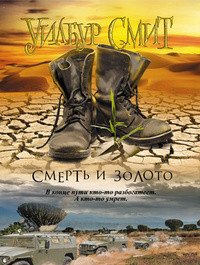Men of Men - Smith Wilbur (книги бесплатно без txt) 📗
The long leaf sight on top of the blued barrel was at maximum extension, set for one thousand yards.
Under Gandang's quiet instructions, the young Matabele rested the rifle in a crotch of the mopani, and fired.
The rifle kicked back viciously, and he shouted joyously. In the little circle a big sway-backed grey horse dropped to its knees, fought briefly to rise and then flopped over on its side.
"Did you see me, my brothers?" howled the warrior.
"Did you see me kill the grey horse?"
Vamba's hands were shaking with excitement as he reloaded and rested the rifle again.
He fired, and this time a bay gelding reared up and then crashed over on its back.
Jee! sang Vamba, and brandished the smoking rifle over his head, and the war chant was taken up by a hundred other hidden riflemen, and the volley of their fire flared up.
"They are almost ready," Gandang thought, as he glimpsed another of the defenders struck down in the renewed gale of gunfire. "There can be few of them who still can shoot. Soon now it will be time to send the spears for the closing-in, and tonight I will have a victory to take to my brother the king. One little victory in all the terrible defeats, and so hard bought."
He slipped away from the shelter of the mopani trunk, and loped swiftly across towards where another of his riflemen was firing away as fast as he could re-load. Halfway there Gandang felt the jarring impact in his upper arm, but he covered the open ground to shelter without a check in his stride, and then leaned against the bole of the mopani, and examined the wound. The bullet had gone in the side of his biceps and out the back of his arm. The blood was dripping from his elbow, like thick black treacle. Gandang scooped a handful of mud and slapped it over the wounds, plugging and masking them.
Then he said scornfully to the kneeling warrior at his side. "You shoot like an old woman husking maize." And he took the rifle out of his hands.
Clinton dragged himself backwards on his elbows, and his legs slithered loosely after him through the mud. He had used the webbing belt from one of the dead men as a tourniquet, and there was very little bleeding. The numbness of the shock still persisted, so the pain was just bearable, though the sound of the shattered ends of bone grating together as he moved brought up the nausea in a bitter-acid flood in the back of his throat.
He reached the blind boy, and paused for his breathing to settle before he spoke. "The others are writing letters, afterwards somebody may find them. Is there anybody at home? I'll write for you."
The boy was silent, did not seem to have heard. An hour earlier Clinton had given him one of the precious laudanum pills from the kit which Robyn had prepared for him before he left Gubulawayo.
"Did you hear, lad?"
"I heard, Padre. I was thinking. Yes, there is a girl."
Clinton turned a fresh page of his notebook and licked the point of his pencil, and the boy thought again and mumbled shyly: "Well then, Mary. You'll have read in the papers, we had quite a scrap here today.
It's nearly over now, and I was thinking about that day on the river Clinton wrote quickly, to keep up.
"I'll be saying cheerio, then Mary. Isn't one of us afraid.
I reckon as how we just want to do it right, when the time comes Quite suddenly, Clinton found his vision blurring as he wrote the final salutation, and he glanced up at the pale beardless face. The eyes were swathed in bloody bandages, but his lips were quivering and the boy gulped hard as he finished.
"What is her name, lad? I have to address it."
"Mary Swayne. The Red Boar at Falmouth."
She was a barmaid then, Clinton thought, as he buttoned the folded page into the boy's breast pocket. She would probably laugh at the note if she ever got it, and pass it around the regulars in the saloon bar.
"Padre, I was lying," the boy whispered. "I am afraid."
"We all are." Clinton squeezed his hand. "I tell you what, lad. If you like, you can load for Dillon here. He's got eyes to shoot, but only one arm, you're got two good arms."
"Bully on you, Padre," Dillon grinned. "Why didn't we think of that."
Clinton draped a bandolier across the blind boy's legs.
There were only fifteen cartridges in the loops, and at that moment, out in the mopani, the singing started.
It was slow and deep and very beautiful, echoing and ringing through the forest. The praise song of the Inyati.
And Clinton turned his head and looked slowly around the circle.
All the horses were dead; they lay in a litter of saddlery and broken equipment, of crumpled yellow scraps of waxed paper from the ammunition packets, of empty brass cartridge cases and discarded rifles. In the confusion, only the row of dead men was orderly. How long was that row, Clinton thought, oh God, what a waste this is, what a cruel waste.
He raised his eyes, and the clouds were at last breaking up. There were valleys of sweet blue sky between the soaring ranges of cumulus. Already the sunset was licking the cloud mountains with soft, fleshy tones of pink and rose, while the depths of the billowing masses were the colour of burnt antimony and tarnished silver.
They had fought all day on this bloody patch of mud.
In another hour it would be dark, but even now there were dark specks moving like dust motes against the high singing blue of the evening sky. The tiny specks turned in slow eddies, like a lazy whirlpool, for the vultures were still very high, waiting and watching with the infinite patience of Africa.
Clinton lowered his eyes, and across the circle Wilson was watching him.
He sat with his back against the belly of one of the dead horses. His right arm hung uselessly at his side, and the wadding over the wound in his stomach was crimson with seeping blood, but he held his revolver in his lap.
The two men held each other's gaze while the singing soared and fell and soared again.
"They'll be coming now, for the last time," Wilson said.
Clinton nodded, and then he lifted his chin, and he, too, began to sing: "Nearer my God to Thee, Nearer to Thee, " His voice was surprisingly clear and true, and Wilson was singing with him, holding the wadding to his stomach wound.
Darkness comes over me, My rest a stone The blind boy's voice cracked and quavered. Dillon was beside him; though his ankle and elbow were shot through, he lay upon his back with a rifle propped on his crossed knees, ready to fire one-handed when they came. His voice was flat and tuneless, but he winked cheekily at Clinton and grinned:
Angels to beckon me Eight of them, all that were left, every one of them wounded more than once, but all of them singing in the wilderness of the mopani forests, their voices tinny and thin, almost lost in the great crashing chords of the praise song of the Inyati regiment.
Then there was thunder in the air, the drumming of two thousand assegais on black and white dappled shields, and the thunder came rolling down upon their little circle.
Allan Wilson dragged himself to his feet to face them.
Because of his stomach wound, he could not stand erect, and the one arm dangled at his side. His service revolver made a strangely unwarlike popping sound in the roar of the war chant and the drumming blades.
Dillon was still singing, snatching the loaded rifles and firing, and singing, and grabbing the next rifle. The blind boy felt the last cartridge into a rifle breech, and passed the hot rifle back to Dillon, and then he groped for another round, his fingers becoming frantic as he realized the bandolier was empty.
"They're finished," he cried. "They are all finished!"




